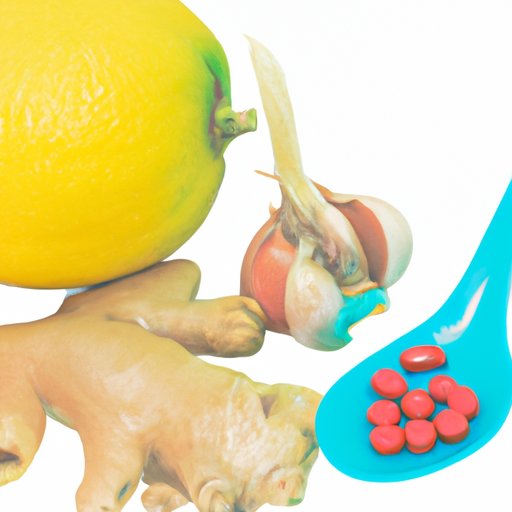
I. Introduction
If you’re experiencing painful and uncomfortable urination, you may be suffering from a urinary tract infection (UTI). A UTI is a bacterial infection that affects any part of your urinary system, including the urethra, bladder, ureter and kidneys. UTIs are one of the most common bacterial infections among women, men and children. The good news is, there are several ways to alleviate UTI symptoms. This article will explore several natural remedies, the power of a balanced diet, hygiene, painkillers and seeking professional medical attention.
II. Natural Remedies for UTI Relief
Natural remedies for UTI relief may offer a simple, cost-effective and low-risk way to alleviate your symptoms. Cranberry juice, for example, contains compounds that prevent bacteria from sticking to your bladder and urinary tract walls. This makes it difficult for the bacteria to grow and reproduce, allowing your immune system to fight the infection effectively. Similarly, D-mannose, a naturally occurring sugar found in some fruits, can treat and prevent UTIs by binding to E.coli before it attaches to your urinary tract. Probiotics, which are beneficial microorganisms that colonize your gastrointestinal and genitourinary tracts, can also help prevent UTIs by promoting healthy bacterial balance and preventing pathogenic strains of bacteria from colonizing your gut and vagina.
It’s worth noting that while natural remedies are generally considered safe, they may not be suitable for everyone. For instance, cranberry juice may not be the best option if you’re on certain medications, or have kidney stones, as it may increase the risk of developing them. Furthermore, D-mannose and probiotics haven’t been scientifically validated as reliable UTI treatments, and in some cases, may even worsen the infection. Therefore, before trying a natural remedy, it’s important to consult with your healthcare provider.
III. The Power of a Balanced Diet
Another way to alleviate UTI symptoms is to adjust your diet. You can start by increasing your water consumption. Drinking plenty of water can help flush bacteria out of your urinary tract, reducing your risk of infection and lowering the intensity of your symptoms. Also, consuming foods high in vitamin C, like oranges and strawberries, can help acidify your urine, making it more difficult for bacteria to grow and reproduce. Similarly, incorporating probiotic-rich foods like yogurt and kefir into your diet can promote healthy bacterial balance, which can help prevent UTIs.
However, it’s important to avoid certain foods and drinks that can irritate your urinary tract and exacerbate UTI symptoms. This includes caffeine, alcohol, spicy foods, and carbonated drinks such as soda. These types of foods and beverages can increase your urine output, as well as irritate your bladder and urethra.
IV. Hygiene and UTIs
Practicing good hygiene habits is crucial for preventing and alleviating UTI symptoms. For example, wiping from front to back after using the bathroom can help prevent bacteria from the colon getting into your urethra. Similarly, urinating before and after sexual activity can help flush out any bacteria that may have entered your urinary tract during intercourse. Also, avoiding the use of scented products such as soaps, lotions, and douches can prevent irritation that can lead to UTIs.
However, over-cleansing can also increase your risk of infection, as it can throw off your natural bacterial balance. And, while baths and hot tubs can be relaxing, they can also be a breeding ground for bacteria. If you’re prone to UTIs, it’s best to avoid soaking in water for extended periods.
V. Painkillers and UTIs
Painkillers such as acetaminophen and ibuprofen can be used to help relieve UTI pain and discomfort. These medications can reduce inflammation and lower fever. However, they don’t talk the underlying infection. If your symptoms don’t improve after a few days of taking painkillers or if they worsen, you should seek medical attention immediately.
It’s important to note that painkillers can have adverse side effects in some individuals. And, overdosing on these medications can lead to liver damage and other complications. Therefore, it’s essential to follow the recommended dosage guidelines and talk with your healthcare provider if you have any concerns.
VI. Seeking Medical Attention
While natural remedies, diet, hygiene and painkillers may provide relief for your UTI symptoms, you should seek medical attention if you notice blood in your urine, fever, chills, nausea or severe abdominal pain. These symptoms may indicate a more severe infection that requires professional treatment.
When you visit your healthcare provider for a UTI, they will likely perform a urine culture to identify the type of bacteria causing the infection and determine the best course of treatment. Treatment typically involves a course of antibiotics to eliminate the infection.
VII. Conclusion
There are several ways to relieve UTI symptoms, including natural remedies, a balanced diet, good hygiene, painkillers and medical attention. However, it’s essential to take precautions when practicing these methods to ensure your safety and efficacy. Remember that prevention is the best medicine, so take steps to avoid introducing dangerous bacteria into your urinary tract, like wiping front-to-back, urinating before and after intercourse and drinking plenty of water. Do your research and don’t hesitate to speak to your healthcare provider if you have any questions or concerns.





